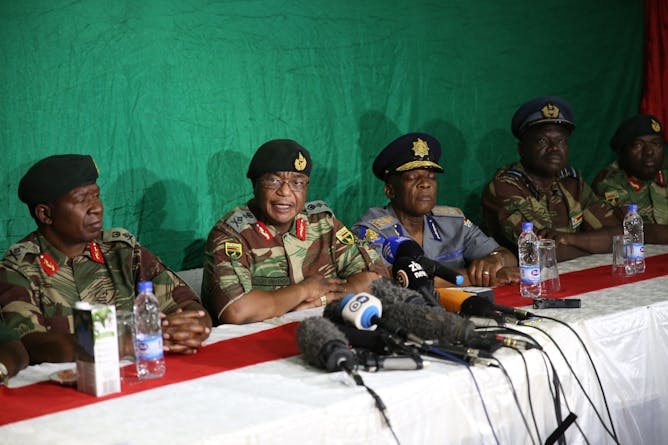|
President Robert Mugabe’s 37-year old despotic and disastrous rule of Zimbabwe is over. While there’s been widespread jubilation in the country following the military’s intervention, Enock C. Mudzamiri cautions that the optimism is misplaced. The country’s military commanders have been less interested in restoring democracy than they are in settling a succession crisis in the ruling Zanu-PF.
Mechanisation is considered a key factor in the push to boost commercial farming across the continent. But many programmes fail. Thomas Daum and Regina Birner explore why, and what can be done to make sure that small farmers, in particular, get better access.
|

Zimbabwe National Army commander Constantino Chiwenga, second from left, addressing the media.
EPA-EFE/Aaron Ufumeli
Enock C. Mudzamiri, University of South Africa
Contrary to popular sentiment that the coup in Zimbabwe would usher in a new era of democracy, the military intervention is much more about a succession crisis in the ruling Zanu-PF.
|
Business + Economy
|
-
Thomas Daum, University of Hohenheim; Regina Birner, University of Hohenheim
Mechanisation of agricultural activity can help many African countries unlock underutilised agricultural potential. But there are serious obstacles which must be removed.
|
|
Science + Technology
|
-
Dale Peters, University of Cape Town
A focus on collaboration among African universities and research institutions is crucial in developing national policies that meet the principles of open data while keeping it safe from exploitation.
|
|
Environment + Energy
|
-
Victor Wasonga, National Museums of Kenya
Reptiles add socioeconomic value but when it comes to accessing detailed reference information about them, students and naturalists can face serious challenges.
|
|
From our international editions
|
-
Linda Dubrow-Marshall, University of Salford; Rod Dubrow-Marshall, University of Salford
Charles Manson, who has died aged 83, was a cult leader par excellence.
-
Jennifer Weeks, The Conversation
Is trophy hunting wholesome sport or pointless violence? The Trump administration moved last week to allow imports of trophy parts from African elephants, but met heavy protest and is reconsidering.
|
|